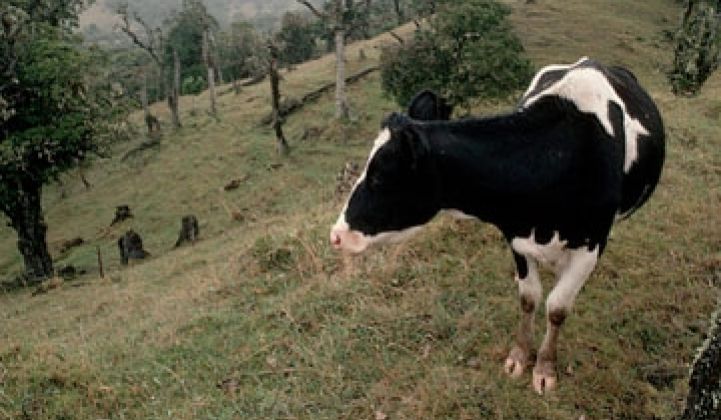Eating less beef and more chicken – that's key to building a successful biofuel industry.
That's the catchy premise of Dartmouth College professor Lee Lynd, who is championing not simply a change to our diet but also a close examination of the best way to use the available farmland.
Speaking at a Society of Industrial Microbiology symposium in San Francisco Tuesday, Lynd said data show that raising cattle is a much inefficient use of cropland than raising poultry. And poultry consumption has gone up among Americans, a trend that could free up land for growing crops for fuel production.
As the government and public give increasing support to boosting domestic production of biofuels, they also have to consider the costs of food – not just fuel – production because both industries require a fair amount of agricultural land, said Lynd, who is spearheading a project he called "Global Feasibility of Large-Scale Biofuel Production." A team made up of researchers from the United States, Brazil, South Africa, the Netherlands and Malaysia
"We haven't had land efficiency for food production as a goal," said Lynd, an environmental engineering design researcher and co-founder of biofuel startup Mascoma. "We just have the opposite – how to keep farmers in business in the face of overcapacity."
About 90 percent of farmland in the United States is used to produce animal feed, not for human food, said Bruce Dale, a Michigan State University professor who also spoke at the symposium. In fact, only 30 million acres of cropland, or about 6 percent of the total farmland in the country, would provide enough food for all Americans, Dale said.
About 7 lbs. of grain are used to produce every pound of beef, Dale said. It takes 1.5 lbs. to 2 lbs. of grain for every pound of chicken and other poultry.
Raising cattle also requires pastures, and that is an inefficient use of land, too, he added. Then there are other costs and environmental impact that come with turning cattle into meat products and shipping them to stores.
Lynd is seeking to re-shape the argument that the push to boost biofuel production would come at the expense of food production and leads to higher food prices.
The "food v. fuel" debate raged last year when many countries began to advocate or implement policies to increase ethanol production (see EU Supports 10% Biofuel Target, Limits Food-Based Biofuels).
The United States has its own biofuel mandate, requiring refineries to gradually increase its biofuel output annually until they reach 36 billion gallons per year by 2022 (see House Passes Energy Bill). The mandate, which was put in place as a result of a 2007 energy bill, spurred a flurry of private equity investments in corn ethanol production and the development of new biofuel technologies, such as turning non-food plants, wood wastes and even garbage at city landfills into fuels.
But it also elicited protests from environmental groups, cattle ranchers and other industry groups. Those critics said food and animal feed prices shot up because more farmers opted to grow corn for fuel or convert forests into farmland. Texas even asked the U.S. Environmental Protection Agency to modify the biofuel mandate last year (see EPA Denies Texas Ethanol Waiver).
A day earlier, the EPA proposed a new plan to boost biofuel production to meet the national mandate. The plan would require refineries to produce biofuels that contribute less greenhouse gas emissions than the biodiesel or gasoline they aim to replace. Producers would have to take into account the emissions from steps such growing crops, land use change and transporting the feedstock (see Feds Propose Controversial Biofuel Mandate, Offer $800M to Boost Production).
Lynd said the public and policy makers need to start thinking about what is the best use of available cropland rather than embracing the ideal that food production is a better and more sustainable use of land than energy production.
Perhaps a good approach is to persuade people to consume less beef, Lynd said. Or to accept the likelihood that food would cost more if the country were serious about relying less on foreign oil.
Some other symposium attendees aren't so sure people would embrace Lynd's premise and alter their diet in the process.
Jack Newman, co-founder of Amryis Biotechnologies, is one of them. Emeryville, Calif.-based Amryis is developing hydrocarbons, which closely resemble the makeup of crude oil, using sugarcane as feedstock. This approach is different than many other biofuel producers that are seeking to turn various plants into ethanol instead. Newman said any approach that would require people to make a big change to their lifestyle would be hard to achieve.
"I don't see much hope in persuading people to eat chicken, and I like chicken," Newman said.



